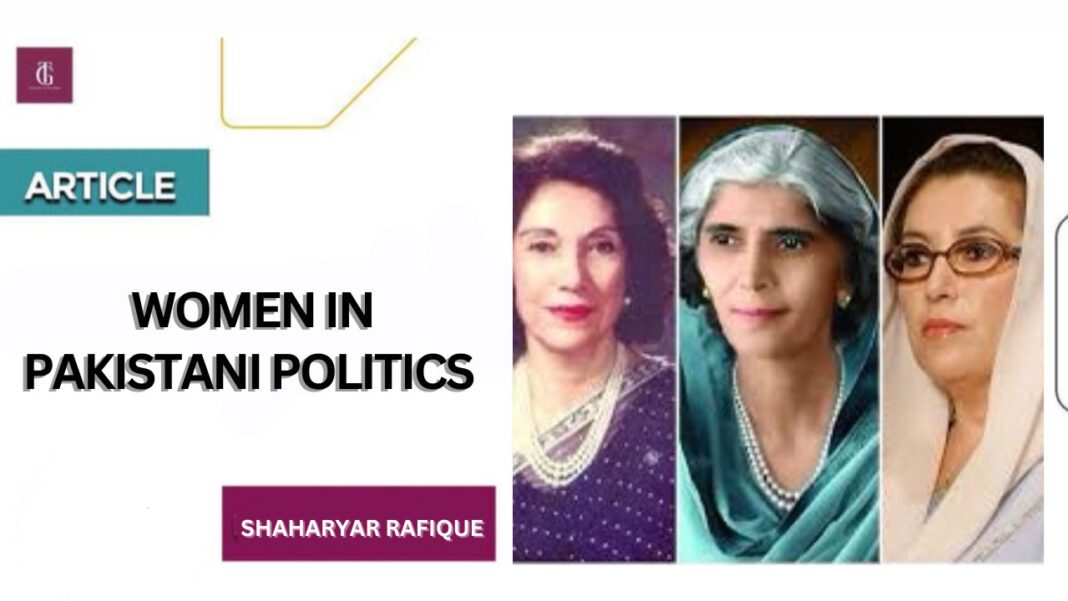The position of women in Pakistani politics is crucial because it provides insights into the intricacies of gender dynamics in a culture shaped by religious standards and cultural traditions. Understanding women’s barriers and possibilities while participating in politics is critical for advancing gender equality and inclusive government. This article aims to delve into the intersection of gender, religion, and politics in Pakistan, shedding light on the historical context, legal framework, religious leadership, political representation, grassroots activism, case studies of influential women politicians, societal perceptions, and prospects. We may learn about women’s roles in Pakistani politics by investigating these elements, paving the path for a more inclusive political environment.
This article aims to examine the complex link between gender, religion, and politics in Pakistan, with a particular emphasis on women’s political engagement. Examining historical events and settings, legislative frameworks and reforms, religious interpretations and influences, political representation at various levels, grassroots action, and case studies of important women politicians will be part of the approach. These parts will be supplemented with appropriate examples, case studies, and factual data to offer a full knowledge of women’s roles in Pakistani politics.
Various variables, including cultural traditions and religious conventions, have impacted the historical backdrop of women’s engagement in Pakistani politics. Women have played crucial roles in numerous political movements throughout history and substantially contributed to society. Fatima Jinnah, the sister of Pakistan’s founder, Muhammad Ali Jinnah, for example, actively participated in the liberation fight and eventually ran for president against General Ayub Khan in 1965. Her campaign emphasized the value of women’s political engagement and set the path for future generations of female leaders.
Furthermore, religious norms and cultural traditions significantly impact gender roles in politics. Because Pakistan is largely Muslim, religious interpretations frequently influence society’s conceptions of women’s political activity. Segregation of sexes, for example, has historically hindered women’s visibility and involvement in public areas, including politics. This cultural practice has influenced women’s political participation and representation.
Pakistan’s legislative framework governing women’s rights and political involvement has evolved significantly. The Pakistani Constitution guarantees equal rights to all people, regardless of gender, and serves as a basis for women’s political development. The Muslim Family Laws Ordinance of 1961, the Protection Against Harassment of Women at Workplace Act of 2010, and the Election Act of 2017 all intended to alleviate gender imbalances and increase women’s political involvement. On the other hand, religious interpretations and cultural attitudes frequently impact the application and efficacy of these laws. For example, orthodox religious interpretations have affected legislation addressing divorce, inheritance, and child custody, limiting women’s autonomy and political power. Despite legislative protections, women continue to confront various obstacles in their political careers.
Religious leaders and organizations wield significant sway over public views toward female political engagement. Islamic theology offers a wide range of opinions on women’s rights and leadership positions, from conservative interpretations that emphasize gender segregation to progressive interpretations that urge for women’s equal involvement in all aspects of life. In Pakistan, prominent religious leaders have played critical roles in molding the discourse around women’s political participation. For example, the chairman of Jamiat Ulema-e-Islam (F), Maulana Fazlur Rehman, has expressed qualms regarding women’s political engagement, citing traditional religious convictions. On the other hand, women academics such as Dr. Amina Wadud have questioned orthodox interpretations and called for greater gender equality within an Islamic framework.
Women’s representation in Pakistani politics at all levels remains a big concern. Gender discrepancies in political representation are exacerbated by barriers such as restricted access to education, cultural expectations, and social prejudices. Religious standards, which are frequently reinforced through cultural practices, contribute to the reinforcement of these barriers. Nonetheless, many women have surmounted these obstacles and made major contributions to Pakistani politics. For example, Benazir Bhutto, Pakistan’s first female Prime Minister, defied conventional expectations and transformed the country’s political scene. Other female politicians, including Sherry Rehman, Marvi Memon, and Shireen Mazari, have faced obstacles and advocated for gender equality in politics.
Grassroots movements and civil society organizations have greatly aided women’s political empowerment in Pakistan. These projects integrate religious teachings with gender equality, allowing women to engage fully in political activities. The Aurat Foundation, for example, has played an important role in boosting women’s political participation by organizing capacity-building programs, campaigning for policy reforms, and conducting awareness campaigns. Furthermore, organizations like Tehrik-e-Niswan have used art and theater to question cultural views and confront gender-based violence, creating a more inclusive political atmosphere.
Case studies of powerful female politicians in Pakistan give useful insights into the dynamics of gender, religion, and politics. Asma Jahangir, a well-known human rights activist and lawyer, for example, managed the junction of gender and religion by pushing for women’s rights within the context of universal human rights. Her work highlighted that women may be politically involved while keeping their religious identity. Similarly, Malala Yousafzai, an internationally renowned champion for girls’ education, has bucked traditional and religious standards by speaking out about education and women’s empowerment, despite threats and violence.
Religious beliefs and cultural traditions frequently impact societal opinions of women in politics. Gender preconceptions, prejudices, and stereotypes restrict women’s political agency, subjecting them to social shame, discrimination, and even violence. Mukhtar Mai, a survivor of sexual assault who later became a champion for women’s rights, endured societal criticism and threats due to her efforts. Efforts to dispel these myths and establish inclusive political spaces are gaining traction. Women’s rights organizations, activists, and civil society organizations are working relentlessly to combat gender-based discrimination and violence and establish safe and inclusive political settings for women. While women’s political engagement in Pakistan has improved, there are still obstacles to overcome.
The prospects for women’s political empowerment depend on various circumstances, including continuous law reform, educational opportunities, and social views.
Several proposals might be explored to establish a more inclusive political atmosphere. These are some examples:
Enhancing legal frameworks: Improve the enforcement and execution of legislation that protect women’s rights and promote gender equality in politics. Invest in early childhood education programs encouraging gender equality, critical thinking, and political awareness. Conduct public awareness efforts that question established norms, address gender-based violence, and emphasize the necessity of women’s political involvement. Encourage political parties to implement gender quotas and promote female candidates, guaranteeing women’s full participation in decision-making. Encourage communication and involvement with religious leaders to improve knowledge of women’s rights within religious contexts and challenge conservative perspectives.
Finally, knowing the interaction of gender, religion, and politics is critical for understanding women’s roles in Pakistani politics. Historical viewpoints, legal frameworks, religious influences, political representation, grassroots action, case studies, and socioeconomic concerns influence the complex dynamics surrounding women’s political engagement. Pakistan may advance towards greater gender equality and enable women to actively contribute to the nation’s political landscape by addressing these concerns and following recommendations for a more inclusive political climate. Continued research, discourse, and action are critical to attaining gender equality and inclusive government in Pakistan.

SHAHARYAR RAFIQUE
The writer is student of political science at School of politics and international relations at Quaid-e-Azam University Islamabad.






